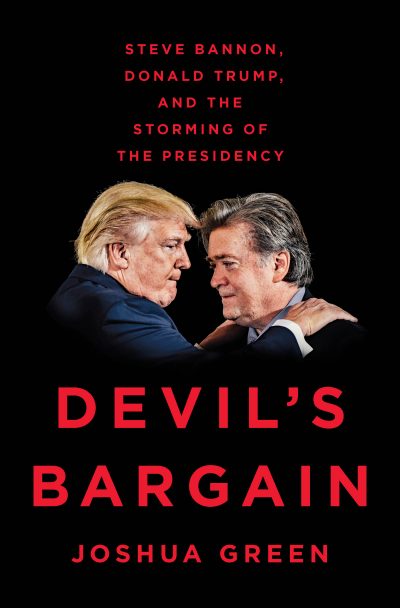Advertisement
Review
Whether Steve Bannon's In Or Out, 'Devil's Bargain' Is An Enlightening Read

The country is roiling over President Trump’s latest remarks on the violence that erupted on the streets of Charlottesville, Virginia. Even before these most recent contretemps, the future of the president’s chief strategist Steve Bannon, known for his ties to the so-called alt-right, was being widely speculated on. By the time you read this, he may be gone. Or, he may have been promoted. Who knows?
Even if it turns out that the Darth Vader of the West Wing is heading for the Trump administration’s revolving door, don’t be dissuaded from picking up Joshua Green’s excellent book, “Devil’s Bargain: Steve Bannon, Donald Trump, and the Storming of the Presidency.”
Bannon is not a likable character, but he is a fascinating one. Page after page, he’s shown to be smart, strategic and as monomaniacal as Ahab. Before you reach the halfway point of “Devil’s Bargain,” you’ll wonder how great it would be if he used his powers for good.
Green is a veteran journalist and former Boston Globe columnist who has the benefit of having interviewed Bannon and his associates for a fall 2015 profile in Bloomberg Businessweek. He’d previously interviewed Trump for the same publication. Usually, Bannon is not a chatty cat; in fact, he makes Jared Kushner look like an auctioneer after two grande double espressos. But Green has a number of quotes from his subject that are expectedly pithy and also quite enlightening, and, along with other interviews and deep research, he’s put together a holistic picture of how Trump won the election. In fact, his account of how Trump defied all expectations is the most comprehensive, objective and clear-headed I’ve yet encountered. He demonstrates how Trump may not have understood the theoretical grounding of Bannon’s “hard-edged ethno-nationalism” but that he proved the perfect vessel for taking it public and at the same time painting a dark picture of modern-day America. Bannon also encouraged Trump to mercilessly hammer away at Hillary Clinton's email server, highly paid Wall Street speeches and the Clinton Foundation’s finances way beyond what any other candidate would have dared do. “Hillary Clinton was the perfect foil for Trump’s message,” Bannon told a reporter in the hours after victory.
The author takes us back to Bannon’s formative years, and traces the myriad influences that turned this son of JFK-loving Democrats from Norfolk, Virginia, into the poster child for today’s rising tide of populist, right-wing nationalism. From his lifelong adherence as a Tridentine Catholic (the type who attend a more traditional version of the Mass in Latin); the lessons he learned about the Muslims nearly conquering Spain 500 years ago at Benedictine College Preparatory School; and a turn in the Navy where he witnessed close up President Carter’s bungled attempt to rescue the Iranian hostages, Bannon has always drawn his own conclusions. This last event was especially impactful, as Green writes: “Anyone seeking to trace the pathogenesis of the Islamophobia that would grip Bannon thirty years hence can follow it back to Tehran and his time in the Middle East.”
After the Navy, Bannon attended Harvard Business School, and then set out on multiple careers — on Wall Street, in Hollywood and, finally, as a conservative firebrand. It’s an impressive resume. Then, as he reached middle age with millions in the bank, a special woman entered Bannon’s life, and everything changed. Her name was Hillary Clinton.
When she was first lady, Clinton famously alluded to a "vast right-wing conspiracy" that was trying to bring her husband down. Whether that network existed then or not is up for debate, but there’s no doubt that people like Bannon turned it into a reality, and a thriving one at that.
Bannon would come to be involved in no less than four enterprises that were gunning to make sure another Clinton never reached the Oval Office. The most important being Breitbart News, a website that (though he may regret these words today) Bannon claimed was “a platform for the alt-right.” Green writes that running Breitbart made Bannon understand “the exhilarating, galvanizing power of being the bad guy, publicly despised by those whom you profess to oppose.” A film company and a research firm devoted primarily to finding Clinton dirt were also part of Bannon’s portfolio.
Some of these enterprises were backed by shadowy billionaire financiers Robert Mercer and his daughter Rebekah. They’ve bought into some harebrained schemes in their day (enumerated by Green), and Bannon became their Virgil, happy to lead them through the underworld of right-wing conspiracy theories and the growing anti-Clinton network.

One of Bannon’s projects hit the jackpot. A book called "Clinton Cash: The Untold Story of How and Why Foreign Governments and Businesses Helped Make Bill and Hillary Rich" by Peter Schweizer examined the murky finances of the Clinton Foundation. The book found a very important audience in mainstream journalists, led of course by Fox. Cable news featured talking heads discussing the book’s evidence and conclusions, and when it came time for Trump to rail about Clinton on the campaign trail in 2016, he had more than enough fodder.
When it looked like Trump’s candidacy was circling the drain, Green tells us that the Mercers, already with millions invested in his candidacy, ordered him to hire Bannon. And thus the two men came together. Trump found someone who encouraged his outré behavior, and Bannon found, as Green puts it, “a blunt instrument” with which to propagate and eventually try to implement a nationalist agenda seeking to increase national security and tighten immigration laws, reconstruct trade agreements to put “America first” and to deconstruct the administrative state.
Green takes us inside the Trump campaign during the various crises that arose, as well as on the nights he clinched the nomination and then when he was elected president. If now, nine months later, Trump is hesitant to fire Bannon, perhaps it’s because he knows it was Bannon’s playbook that carried the day.
After reading Green’s book, my takeaway is that both Bannon and Trump are driven by innate grievances, manifest as a constant voice inside that cries out when they perceive unfairness, especially perpetrated against themselves or that prevents the world from being as they feel it should be. When this happens, they strike out: Trump gives another surreal press conference or dispatches a few incendiary tweets, while Bannon works more systematically, playing to the electorate’s worst instincts.
So much of the reporting on Trump and company has, understandably, been of the breathless variety. Green for the most part dispassionately lays out his case throughout “Devil’s Bargain.” He does allow himself a few pointed conclusions at the end. One is that Trump’s lack of focus and the growing number of controversies and investigations he’s embroiled in will kill any chance of his pushing through Bannon’s dreamed-of nationalist agenda. The upshot? “It’s hard to imagine,” Green concludes, “that Bannon and the legions he spoke for will wind up as anything other than the latest partners disappointed when their deal with Trump turns sour.”
